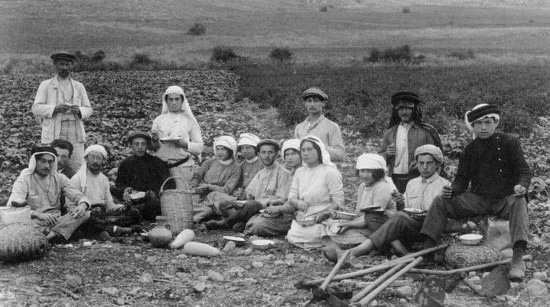Kibbutzim

Credit: Ya'ackov Ben-Dov (1882–1968)
Licence: Public Domain Israel (age)
1912
| Giver: | Community |
|---|---|
| Receiver: | Individual or unstructured/informal group |
| Gift: | Other, Time |
| Approach: | Reciprocal Gift |
| Issues: | 10. Reduced Inequalities, 11. Sustainable Cities and Communities, 16. Peace, Justice and Strong Institutions |
| Included in: | Mutual Aid, Religious Giving |
Derived from the Hebrew word for “gathering,” a kibbutz is a cooperative settlement organized according to principles of mutual assistance, democratic representation and social justice. One of the central tenets of the kibbutz ideal is the inherent dignity of work, regardless of how menial the task. Kibbutz members share responsibility for cultivating food, raising and educating children and performing other labor essential to the well-being of the whole.
The first kibbutz originated in 1910, when a group of Russian Zionists (Jews committed to creating and maintaining a Jewish national state in Palestine) established the Degania_ _settlement near the Sea of Galilee. Lacking financial resources and farming experience, these pioneers struggled at first to tame the arid, rugged terrain. Over time, however, they taught themselves to cultivate the land, transforming the unforgiving soil into a sustainable agricultural community.
By the 1930s and 1940s, numerous other kibbutzim had sprouted up across the Palestinian landscape, all founded according to the same values of collaboration and shared sacrifice. The kibbutzim assumed a critical role in developing and settling the region, providing the economic foundation for what became the modern Israeli state.
In contrast to traditional Jewish society, which organizes itself around home and family, a kibbutz operates as a collective. On the kibbutz, adults help each other raise children, and meal preparations take place in a communal kitchen. The dining hall resides at the heart of community life, a place where kibbutzniks (members of the collective) can meet and enjoy the bounty of their labor. While farming has traditionally represented the core of kibbutzim economic activity, most settlements also engage in some form of industry.
The kibbutzim peaked during the 1970s and 1980s, after Israeli’s victory in the Six Day War attracted an influx of new immigration to the Jewish state. This dynamic shifted during the 1990s, when an economic downturn forced kibbutzim to privatize many of their operations. As members left the rural collectives to pursue economic opportunities in urban areas, many kibbutzim hired outside workers to help address the labor shortage. Many kibbutzim even introduced tourist activities as a way to generate additional revenues.
By the 2010s the kibbutzim began to experience a resurgence. Drawn to the social and economic ideals of cooperative living, new waves of volunteers helped revive the communitarian spirit of the original settlements. The Covid-19 pandemic also sparked renewed interest in the kibbutzim, as life under quarantine led many young people to reevaluate their priorities. With a new generation eager to create communities grounded in egalitarian values, the kibbutzim have again assumed a prominent place in the Israeli national identity.
Contributors: Maha Tazi, Stephen Meyer, Stephen Meyer
| Source type | Full citation | Link (DOI or URL) |
|---|---|---|
| Publication |
Abramistzky, Ran. The Mystery of the Kibbutz: Egalitarian Principles in a Capitalist World. The Princeton Economic History of the Western World, 2018. |
ISBN 9780691177533 |
| Website |
Fidler, Jon. “The Kibbutz & Moshav: Then & Now. Jewish Virtual Library” Israel Foreign Ministry. n.d. |
https://www.jewishvirtuallibrary.org/then-and-now-of-the-kibbutz-movement |
| Book |
Gavron, Daniel. The kibbutz : Awakening from Utopia, Lanham. Rowman & Littlefield, 2000. |
https://books.google.com.pr/books?id=5wifOjaA2BoC&q=Neve+Yam&dq=editions:ISBN0853236089&source=gbs_word_cloud_r&redir_esc=y#v=snippet&q=Neve%20Yam&f=false |
| Website |
Israel, Hulda. “Kibbutz reinvents itself after 100 years of history”. Taipei Times, 2010. |
https://www.taipeitimes.com/News/editorials/archives/2010/11/16/2003488628 |
| Website |
Rubinstein, Amnon. “Return of the kibbutzim,” Jerusalem Post, 2007. |
https://www.jpost.com/opinion/op-ed-contributors/return-of-the-kibbutzim |